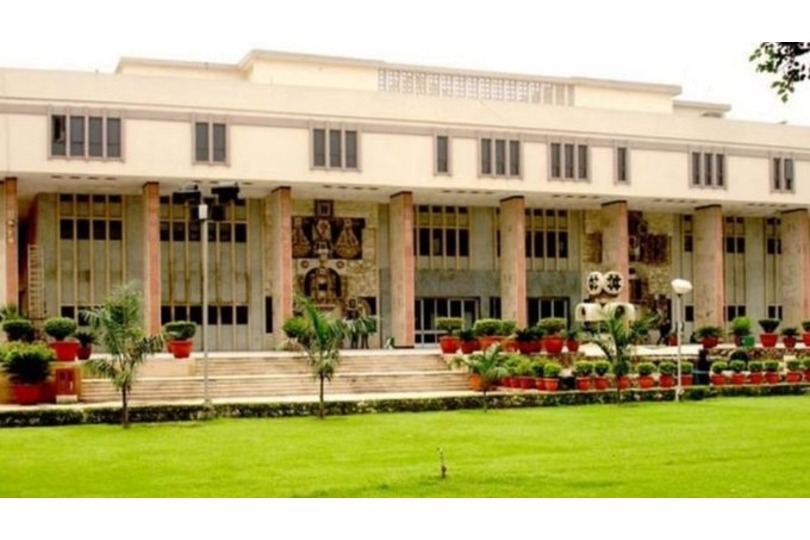What HC conflict between 'rogue' websites & large publishers could mean for open access to research
The lawsuit, which is scheduled to be heard in July, raises concerns about the public's access to reasonable scientific and social science research.on Feb 16, 2023

New Delhi: In a nearby high court, giants of the academic publishing industry have been battling to put an end to an uprising that is being led by "rogue" websites and the "Robin Hood" of science. Free access to a vast array of scientific and literary works in the social and natural sciences is at risk, and the decision could have an impact globally.
The case in question is a copyright infringement lawsuit brought in the Delhi High Court against Sci-Hub and LibGen, two websites that offer free access to a plethora of books and research papers.
Elsevier, Wiley India, Wiley Periodicals, and the American Chemical Society—top academic and scientific publishing firms that market, sell, and licence several digitised publications, including The Lancet and Cell—filed the case in December 2020. Therefore, the three publishers are the sole owners of a number of publications in the social and natural sciences. They are now demanding that the sharing of their "literary works" on the two websites be barred.
Similar legal actions brought by the journals against the two websites have been filed in a number of other nations, including Austria, Belgium, Denmark, France, Germany, Italy, Portugal, Russia, Spain, and Sweden.
The case has been brought before the Delhi High Court at least 40 times in the last two years. However, no temporary ban or injunction has yet been issued against the websites.
While the high court is hearing the case, a number of academics and researchers have made statements and merged together to support Sci-Hub and LibGen. They also emphasized the potential effects any publication ban on the websites would have on Indian research.
Legal and scientific authorities have also drawn attention to a wider "systemic problem," urging the public sector and the scientific community to address the root causes of the necessity for such websites. They have advocated for broader accessibility initiatives and floated the notion of a "Netflix for research."
‘Revolutionised science’
The "Robin Hood of Science" and founder of Sci-Hub, Alexandra Elbakyan, who is headquartered in Kazakhstan and is named in the publishers' lawsuit, is a computer programmer. Additionally, they have brought legal action against a website known as Library Genesis or LibGen. The Delhi High Court has no knowledge of and no representation from LibGen's proprietors.
8.8 billion research articles and books are reportedly available for free reading on Sci-Hub. Previously, "knowledge was only available for costly rates that the majority of people could not pay... By making all paid knowledge available for free, Sci-Hub has revolutionised science.
According to the website's statistics, India came in third place among the nations that downloaded the most papers from Sci-Hub in the previous month with more than 26 lakh articles downloaded. In contrast to this, the plaintiff journals only offer a small number of their publications as open access, and the vast bulk of their articles are only accessible via subscription.
According to computational biologist Rahul Siddharthan of the Institute of Mathematical Sciences in Chennai, scholarly journals are "exorbitantly costly" for the general population. For instance, he stated, "a single article in Cell (an Elsevier publication) costs $39.95 (about Rs 3,300) plus taxes for 24 hours of access.
He continued by saying that individual and institutional subscriptions are "just beyond the grasp" of both, and that the great majority of Indian higher education institutions only subscribe to a relatively small number of scholarly journals. Scientists that create these articles are often "glad to freely spread their work" because they are not paid for them and do not receive any royalties.
Sci-Hub should be viewed as a free library that helps educate students and researchers who cannot afford subscriptions to such materials,” he said.
Several social science researchers connected to universities all around Delhi have submitted an appeal to the court since the lawsuit was filed, claiming that any move to prohibit the websites would negatively affect them. A group of 20 scientists and academics as well as the Delhi Science Forum and Society for Knowledge Commons had also submitted applications to the court, emphasising the value of the websites for research.
The case of the DU copy
Advocate Nilesh Jain, a user of the website, is among those defending Sci-Hub. “I first learned about websites like Sci-Hub and LibGen while pursuing my master's at Delhi University in 2016, and I started utilising them frequently for my papers and presentations after that. These websites came as a tremendous relief because I truly did not have the tools at the time to access all the research papers and books that I needed”, Jain told ThePrint.
He also asserted that even though Delhi University at the time had thousands of students, there were only a handful of computers in the main library that they could use to access the databases of scientific publishers. Several of these machines were also non-functional.
He was motivated to assist Elbakyan as soon as he read her tweet about the litigation being filed in the Delhi High Court because he had firsthand experience with this lack of resources. Since then, a number of attorneys have jumped on board to support Elbakyan, including senior attorney Gopal Sankaranarayanan and intellectual property lawyer Rohan K. George.
Sci-Hub emphasised the allegedly exploitative business model of the plaintiff journals in its defence, which was presented to the Delhi High Court in January 2021 and a copy of which ThePrint has access. Then, it claimed that Article 52(1)(a)(i) of the Copyright Act prohibited the publishers' lawsuit from proceeding. This clause is also referred to as the "fair dealing exception." It permits equitable handling of artistic, theatrical, musical, or literary works for personal use including research.
The education exception, which allows the reproduction of copyrighted work by a teacher or student in the course of instruction, has also been cited by social science researchers who have petitioned the court in support of Sci-Hub and LibGen.
The historic DU photocopy case, in which Oxford University Press (OUP), Cambridge University Press (CUP), and Taylor & Francis (T&F) sued the Rameshwari Photocopy Service, has also been mentioned by experts since it occurred. The Delhi University granted this little copy shop permission to create course packets for students that included photocopies of the pertinent passages from the books listed in the syllabus.
The case had drawn attention because of its implications for the price and accessibility of education. The high court's single-judge panel had dismissed the lawsuit in September 2016 after finding that the photocopier's activities did not constitute a violation of the publishers' copyright.
The verdict was hailed as a significant win for access to education while taking into account the socio-economic realities of India, relying on the fair dealing and education exceptions.
A division bench of the Delhi High Court had likewise interpreted the education exception in December 2016 to say that any given work can be reproduced as long as it is required for educational teaching.
The publishers have argued before the supreme court that these "rogue" websites should be permanently barred. This word originates from a Delhi High Court decision dated 10 April 2019 that uses it. In this ruling, the court prohibited viewing of pirated movies and television shows on about 30 torrent websites and ordered internet service providers (ISPs) to block these websites.
Film production companies, including Twentieth Century Fox and UTV Software Communication Ltd., complained to the court in that case, claiming that these websites permit streaming and downloading of their copyrighted work (movies, television shows etc).
The court had stated that "digital piracy has damaged the movie business," siding with these production companies. It was decided that blocking whole "rogue websites" rather than just a specific URL containing the infringing content is the proper course of action. It also listed nine criteria for labelling a website as "rogue."
Sci-Hub and LibGen have been designated as "rogue websites" by the petitioner journals, who also want a dynamic injunction granted against them.
The Delhi High Court created the dynamic injunction remedy in the same 2019 decision to combat the threat of "hydra-headed" websites that produce several mirror or alternative connections to access their content after they are prohibited.
The publishers can simply go to the court's joint registrars to prohibit any new domains or mirror websites if a dynamic injunction is imposed, negating the need for them to go back to the courts to request that new domains or mirror websites be blocked. However, experts have called for methods to ensure that blocking injunctions are appropriate and proportionate and criticised this remedy for being "unclear" and "over-broad" in some circumstances.
Sci-Hub had promised the court in December 2020 that it would not post any fresh materials to its website. The court declared on January 6, 2021, that this undertaking would last until the following hearing.
However, this duty was not expanded by a future court judgement. To commemorate Sci-tenth Hub's anniversary, Elbakyan promised the publication of more than 23 lakh new articles on September 5, 2021.
In the same month, the publishers' attorneys brought up the situation in court, asserting that Sci-Hub had broken its commitment. The court did not extend the promise after its January order, according to Sci-Hub, who had argued that it had expired.
The court is debating whether to award an interim injunction in the lawsuit and the next hearing is scheduled for July 12.
A Netflix Research?
Swaraj Whatever the outcome of the case, according to Paul Barooah, managing editor of the intellectual property blog SpicyIP, it has highlighted a crucial issue that both the scientific community and the government need to address.
This inquiry results from examining the origins and initial popularity of websites like Sci-Hub and LibGen. We can address broader systemic problems by figuring out why there was a need for these places in the first place, he said.
It remains a "mere paper tiger" provision, according to Barooah, until there is a practical means to really apply the exception under Section 52 of the Copyright Act. "With journal articles behind paywalls and the demand of technological skills mixed with the danger of legal fines for trying to overcome paywalls — how can one realistically benefit from a personal use or research exception," he queried.
He added that because journal papers are still behind paywalls, there is frequently "no clear means of doing this' ' if a researcher truly wants to exploit the fair dealing exception and use a copyrighted work for research, which is permitted by law. Barooah thinks there are methods to make this a reality. He cited the Delivery of Public Books and Newspaper Act, 1954 as an example, which mandates that two copies of each publication be deposited with two public libraries in India.
To which Barooah responded, "If this were being followed, perhaps there would already be a real, even if partial, opportunity to avail of the legally powerful fair dealing exclusions in our law." Barooah remarked that this provision "looks like another paper tiger provision with very little enforcement."
"I have witnessed that students, even from poor colleges, study online via open courseware and also enthusiastically read scientific literature," the computational biologist Siddharthan stated.
He contends that denying these pupils access to scholarly information would be "severely damaging." He suggests that one way to find a solution is to push the scientific publishing sector to look into ways to make access for the general public more inexpensive.
"A similar situation occurred in the music and film industries 20 years ago with the fear around Napster, BitTorrent, etc. Instead of using bans to fix the issue, legal, affordable options like Netflix, Amazon Prime, and iTunes were used instead, he said.



.jpg)






.jpg)

.jpg)
.jpg)
.jpg)
.jpg)

.jpg)










Sorry! No comment found for this post.